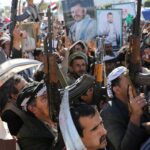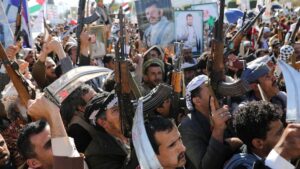
Lebanon’s Mikati and Syria’s al-Sharaa discuss bilateral issues, including smuggling between the two countries and border challenges.
Lebanon’s caretaker Prime Minister Najib Mikati has said Beirut and Damascus will work together to secure their land borders, as well as to delineate both land and sea borders.
In the first trip by a Lebanese prime minister to neighbouring Syria in 15 years, Mikati addressed a joint news conference with Syria’s de facto leader Ahmed al-Sharaa in the capital Damascus on Saturday.
Al-Sharaa said they had discussed issues including smuggling between the two countries, border challenges, and Syrian deposits in Lebanese banks.
He said he expected “long-term strategic relations” with neighbouring Lebanon after the crisis-hit country elected a much-needed president.
“We and Lebanon have great shared interests,” al-Sharaa added.
Both sides agreed to establish committees to address these matters and provide support.
Al Jazeera’s Hamza Mohamed, reporting from Damascus, said the two leaders agreed to work to prevent smuggling between the two countries.
“Smugglers used to send weapons and drugs from Syria into Lebanon,” he said.
Advertisement
“This was quite important for the Lebanese leader and he mentioned that,” our correspondent added.
Lebanon’s eastern border is porous and known for smuggling.
Lebanese armed group Hezbollah supported al-Assad with fighters during Syria’s civil war.
However, the Iran-aligned movement has been weakened after a war with Israel killed its longtime leader and damaged the group’s firepower, a factor helping the Syrian rebels to seize Damascus last month.
Refugees
Al Jazeera’s Mohamed also said al-Sharaa stressed that his country was trying to find a way to resolve the question of Syrian refugees in Lebanon – a large burden to the country’s crippled economy.
Lebanon is estimated to host about 1.5 million Syrian refugees, who fled the civil war in the country that started in 2011.
About 13 years of conflict have killed more than half a million people, ravaged the economy, and pushed millions to flee their homes as they were displaced internally and externally.
Lebanon’s newly elected President Joseph Aoun said on Thursday that there was a historic opportunity for “serious and equitable dialogue” with Syria.
For much of the al-Assad family’s five decades in power, Syria held significant influence over Lebanon, maintaining a military presence for 29 years in the face of widespread opposition from many Lebanese.
Syria eventually withdrew its troops in 2005 under international pressure after the assassination of Lebanese former Prime Minister Rafik Hariri.











More Stories
Israel steps up Gaza attacks amid renewed ceasefire push
Firefighters race to contain LA wildfires as winds expected to pick up
What’s next for Yemen as Israel attacks again?